
What You Should Know About Getting a Tattoo Certificate
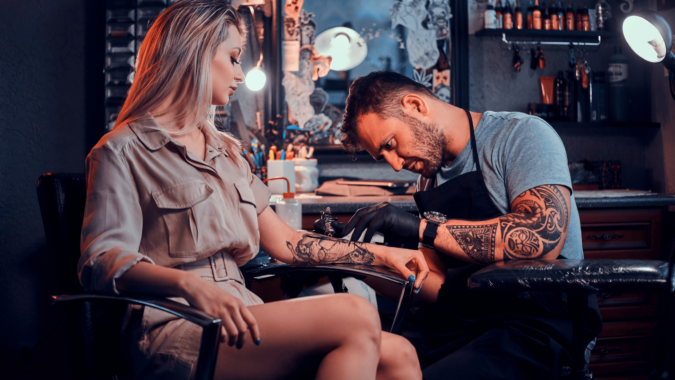
With tattoos becoming increasingly popular, the demand for professional tattoo artists has never increased. However, aspiring tattoo artists must understand what’s involved in getting a tattoo certificate before officially entering this demanding field. Becoming a successful tattoo artist isn’t just about artistry — obtaining certification is necessary from a legal standpoint and as evidence that you are qualified and can adequately create art pieces on your body while ensuring safety procedure standards are met. Here, we’ll discuss everything you need to know about getting your certificate as a licensed tattoo artist so you can get started in the industry doing what you love best: creating masterful artwork!
The Life of a Tattoo Artist – Getting a Tattoo Certificate
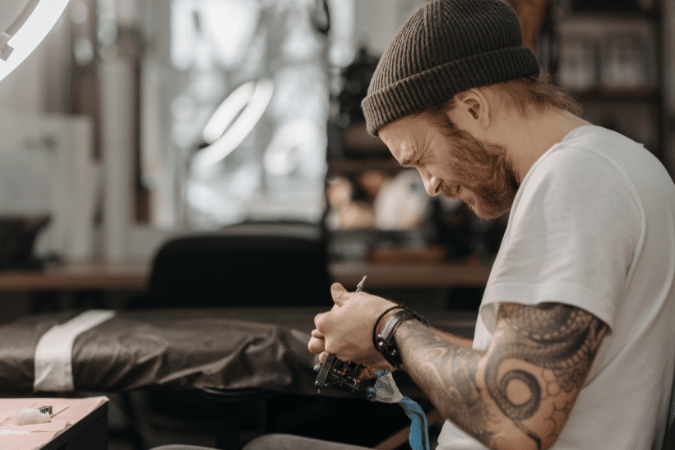
Tattooing is an art form that has been around for centuries, and in modern times, the popularity of tattoos has skyrocketed. But who are the people behind this growing industry? What does it take to become a tattoo artist? Let’s take a closer look at the life of a tattoo artist.
The Career Path
Tattoo artists have various backgrounds and experiences but require specific qualifications and traits. To be successful in this field, you must be creative and have an eye for detail. You also need to understand anatomy and possess excellent communication skills. Moreover, you must know sanitation laws and regulations to ensure your work environment is safe.
It takes dedication and hard work to become a tattoo artist. Most apprenticeships last between one-three years and involve learning about safety protocols, applying tattoos on practice skin or fruit, learning how to use different types of tattoo equipment, studying color theory, and gaining practical Experience with clients, despite being more common now than ever, becoming a tattoo artist still requires grit and resilience due to the competition within the industry.
How Do Tattoo Artists Work?
Once certified as tattoo artists, most will begin their careers in established studios where they can hone their craft under experienced tutelage or gain access to capital equipment such as autoclaves for sterilizing tools. Many opt to work independently from home studios or rent space from existing shops to build their clientele base with minimal overhead costs. In either case, most will charge by the hour along with extra fees for custom designs or artwork that requires additional time to complete.
Tattoo artists are creative individuals who possess both an artistic flair and an understanding of technical aspects such as anatomy and safety protocols necessary for providing quality services in this industry. It takes dedication to complete the apprenticeship process and start working independently. However, those who succeed have potential careers that offer flexibility while allowing them to express themselves using their unique talents. To become a tattoo artist, research local training courses available today!
How to Become a Professional Tattoo Artist?
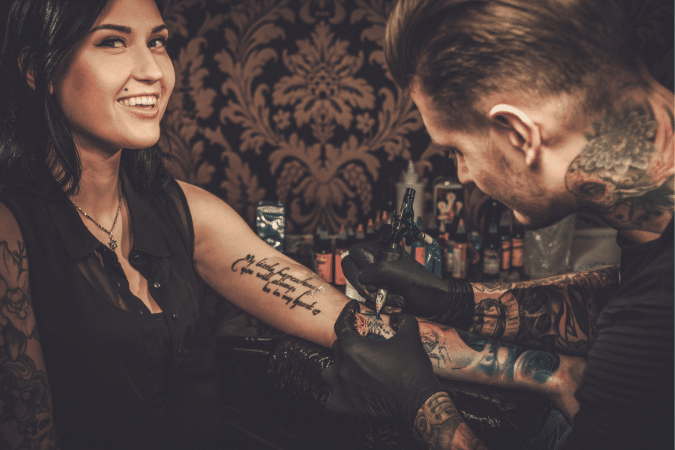
There are many steps to becoming a professional tattoo artist, but if you’re willing to put in the time and dedication, you can make it happen. With this guide, you will have all the information you need to start your journey toward becoming a professional tattoo artist. From finding mentors and gaining Experience to getting certified, we will walk you through each step of the process.
1. Finding Mentors
The best way to learn how to become a tattoo artist is by finding mentors who already work in the field. Talk to experienced artists at local parlors or join online forums and message boards to find experienced professionals that can help guide you through the process. In addition, your mentors can provide valuable advice about building your portfolio, finding apprenticeships, and staying up-to-date on industry trends.
2 Gaining Experience
Once you’ve found a mentor or two, it’s time to start gaining Experience in the field. A tattoo apprenticeship is one of the best ways to get hands-on Experience working with clients and learning from veteran artists. You should also focus on honing your skills by practicing on yourself or friends as much as possible—this will help build your confidence in tattooing and lead to free tattoos for those close to you!
3. Getting a Tattoo Certificate
You must obtain a certification/tattoo license before performing tattoos professionally. Depending on where you live, there may be special regulations for certifying body art professionals. So research these requirements thoroughly before beginning the certification process. Your certificate or high school diploma must be from an accredited institution since most states require artists to be certified as part of their licensing procedure. Additionally, some employers may require additional credentials depending on their standards or local laws.
4. Finding a Reputable Tattoo Studio
Once you have obtained your license from the health department, it’s time to start looking for reputable tattoo studios that will hire you as an employee or allow you to rent space in their shop as an independent contractor. You should look at reviews of different studios online and talk with people who have gotten tattoos there about their experiences. Additionally, seeing what other artists are doing in nearby shops will give you ideas about how to set yourself apart from them as an artist. It also helps if the shop has good relationships with local suppliers so that they can provide quality supplies at reasonable prices.
5. Taking Classes on Proper Tattooing Techniques
Once you have found a good shop that fits your needs, it’s time to hone your skills! Many shops offer classes on proper techniques that can help ensure that your tattoos look great every time – this includes learning how to mix ink colors properly, properly handle needles and equipment, and how best to design tattoos that customers will love. In addition to these classes, many artists also attend seminars or conventions where they can learn more about specific styles of tattoos or meet other experienced professionals who can help them continue their growth as an artist!
6. Building Your Portfolio
Your portfolio is essential to any successful career as a tattoo artist. So make sure you create one that showcases your skills and creativity. Include photos of tattoos that demonstrate different techniques, styles, shapes, sizes, colors, and pieces that showcase any custom designs or artwork you have created yourself. You should also include sketches or drawings done by yourself if they apply – this can set your portfolio apart from other applicants when looking for jobs!
7. Marketing Yourself
Once your portfolio is complete, it’s time to market yourself as a professional tattoo artist! Word of mouth is critical here. Network with fellow artists at conventions and events and ask them for referrals when possible (and don’t forget about those mentors from step one!). Try reaching out directly to potential customers via social media platforms such as Instagram or Twitter – if they like,e what they see, they will return for more!
8. Remaining Up-To-Date & Open To Criticism
The world of body art is constantly evolving. Hence, it’s important for professional tattoo artists to stay up-to-date on industry trends and best practices – read articles online, attend workshops/classes whenever possible, and take advantage of continuing education opportunities offered by local establishments or organizations! Finally, remember that criticism is an essential part of growth – don’t let negative feedback deter you from pursuing your dreams – use it instead as an opportunity for self-improvement!
Becoming a professional tattoo artist takes patience, but with hard work and dedication, anyone can make their dream job a reality! Following these six simple steps:
- Finding mentors
- Gaining Experience through apprenticeships/practicing on yourself/friends
- Obtaining proper certifications
- Creating an impressive portfolio
- Marketing yourself
- Remaining open & up-to-date
You’ll be well on your way toward achieving success in this rewarding field!
Getting a Tattoo Certificate – What Certification Requirements Do Tattoo Artists Need?
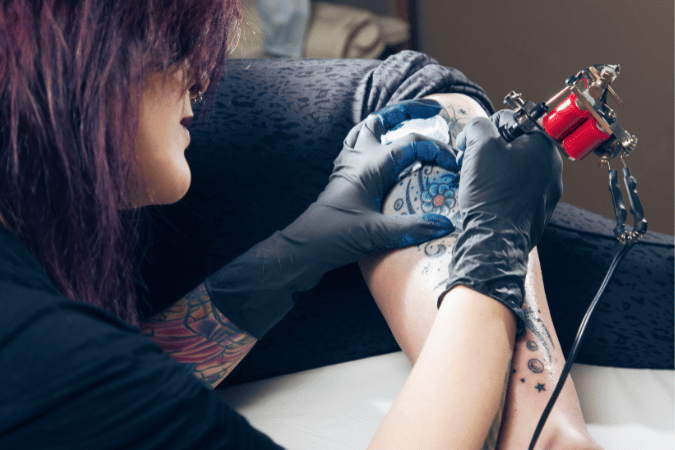
If you’re considering a career in tattooing, it is essential to understand the certification requirements expected of professional tattoo artists. In addition to mastering the techniques required for creating beautiful works of fine art on the skin, becoming a certified tattoo artist requires completing several safety and sanitation courses.
OSHA Bloodborne Pathogens Certification
The Occupational Safety and Health Administration (OSHA) has developed a “Bloodborne Pathogens Standard” training course that all tattoo artists must take and pass to receive their certification. The course covers identifying potential hazards and protecting yourself from exposure to bloodborne pathogens. This course also teaches proper sterilization procedures, safety protocols for dealing with needles, and other safety considerations when working with clients.
Certified First Aid Course
In addition to receiving an OSHA Bloodborne Pathogen Certificate, most tattoo artists must also complete a first aid certification. This course teaches essential life-saving skills that may be needed if a client has an adverse reaction or infection due to the procedure. In addition, these courses provide valuable instruction on administering first-aid treatments before medical professionals arrive.
CPR Certification
In some cases, professional tattoo artists may also require a CPR certification to ensure they can respond quickly should an emergency arise during the procedure. A CPR certification is valid for two years after completion and can usually be renewed by taking another class or refresher course offered at a local hospital or community center.
Becoming a certified tattoo artist requires more than artistic talent. It also involves knowing about necessary safety protocols when working with clients. To become certified, one must receive their OSHA Bloodborne Pathogen Training certificate, complete a Certified First Aid Course, and potentially get their CPR certification, depending on local regulations. With these certifications, you will be well-prepared for your career as a professional tattoo artist!
State-Specific Certifications for Tattoo Artists in the US – Getting a Tattoo Certificate
Becoming a tattoo artist isn’t as easy as picking up a machine and some ink. Depending on where you live, there may be additional certification requirements to practice the profession legally. In addition, the United States is divided into many regions, each with its own set of regulations for tattooing. Today we’ll look at the certifications necessary for aspiring tattoo artists in some areas.
Northeast US (Maine, New Hampshire, Vermont, Massachusetts, Connecticut, Rhode Island)
In this region, tattoo artists must have a license issued by the Department of Health or its equivalent within that state. An apprenticeship is also necessary to become a licensed tattoo artist in Massachusetts and Connecticut. To get licensure, you must also complete advanced training, such as Bloodborne Pathogen Training and First Aid/CPR.
Midwest US (New York, Pennsylvania, Ohio, Illinois)
In this region, all states require that you get licensure from their respective Health Departments before practicing professionally. In addition to having general liability insurance and completing blood-borne pathogen training and first aid/CPR certifications, you may also need additional credentials, such as an Infection Prevention course and infection control protocols.
South US (Virginia, North Carolina, South Carolina, Georgia)
This region requires that all tattoo shops comply with specific sanitation and hygiene standards and regulations before being approved for licensure. Any person applying for licensure must provide proof of completion of courses related to blood-borne pathogens and infection control protocols to receive approval from their respective health departments. You must complete an apprenticeship program in North Carolina and Virginia to become licensed as a tattoo artist.
Southwest US (Texas)
Texas requires that anyone wanting to become a professional tattoo artist first get a license from the Texas Department of State Health Services (DSHS). To get this license, applicants must submit proof of completing courses related to safety principles for infection control practices and blood-borne pathogens, along with other documents such as proof of age, etc. In addition, DSHS has implemented strict regulations governing sanitation practices to which all licensed establishments must adhere to remain open for business.
West US (California)
California requires that anyone wanting to become a professional tattoo artist first get certification from the California Board of Barbering & Cosmetology (BBC). Applicants must submit proof of completion of courses related to safety principles for infection control practices and blood-borne pathogens along with other documents such as proof of age etc., before being approved as certified professionals by BBC. In addition, any establishment wishing to run a successful business must follow strict guidelines by BBC pertaining specifically to sanitary practices, including but not limited to sterilization guidelines.
Tattoo artists who wish to practice professionally need more than talent. They also need certification! Depending on where you live, there will probably be state-wise certification requirements that all aspiring professionals should consider before beginning their career journey into becoming professional tattoo artists. However, with proper education, training, and certification, anyone can become successful when pursuing their passion if they remain dedicated, focused, and committed to achieving their goals!
Getting a Tattoo Certificate – What to Expect When Studying for Your Tattoo Certification Exam?
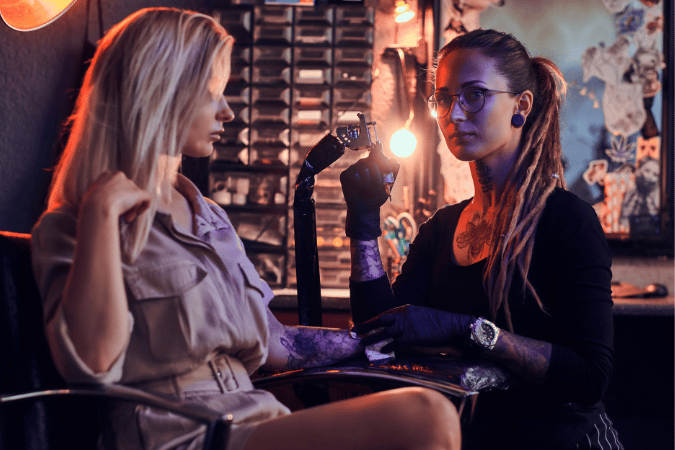
Becoming a licensed body artist is an exciting endeavor, and one requirement for receiving your certification is passing the tattoo certification exam. While no two exams are the same, you can follow some universal tips to ensure you’re prepared for test day. First, consider what things to remember when studying for your tattoo certification exam.
Understand the Requirements of Your Particular Exam – Getting a Tattoo Certificate
The first step to completing your tattoo certification exam is understanding precisely what it entails. Depending on where you live, requirements may vary significantly. For example, some states may require applicants to take a practical or written exam, while others may have a written exam or both. Knowing which type of exam is required beforehand will help you focus on the suitable material when studying.
Be Prepared with First Aid Training
In addition to knowing how to use a tattoo machine and design tattoos properly, many states also require aspiring body artists to have basic knowledge of first aid procedures. This includes CPR and essential safety protocols like sterilizing equipment and disposing of used needles properly. Ensure you brush up on these topics before taking your certification test, as questions about them may be included in the exam.
Know Where You Can Get Help if Necessary When Getting a Tattoo Certificate
Studying for any test can intimidate and overwhelm you. Therefore, knowing where to turn for help is essential. Depending on where you live, many organizations offer courses designed specifically for those studying for their tattoo certification exams. Alternatively, many online resources provide helpful advice regarding preparing for this type of test.
Your tattoo certification exam should not be taken lightly. It requires time and dedication to pass with flying colors! Make sure you understand what type of test is needed in your state, brush up on first aid training, and find out where you can get help if needed—these steps should set you up nicely when it comes time to sit down and take your certification exam!
How Much Does Getting a Tattoo Certificate Cost? Getting a Tattoo Certificate
A significant fee is attached for body modification artists in the US hoping to get certified in body piercing and other tattooing techniques. On average, the certification cost can range from $500 to $2,000, depending on your experience level, the type of course you pursue, and the geographical location.
The courses typically include classroom and clinical training to ensure applicants thoroughly understand body modification safety and state regulations. After their studies, many body modification artists find it beneficial to purchase additional supplies or equipment to help them stand apart from other professionals in their region.
By investing upfront in certification and additional body mod supplies, practitioners have access to more opportunities for establishing client relationships to make body art a long-term profession.
The Many Benefits of Becoming a Tattoo Artist
Becoming a tattoo artist is more than just a job. It is an art form. As a tattoo artist, you can use your creativity and skill to make beautiful artwork that can last a lifetime. And while being a tattoo artist requires dedication and hard work, many rewards come with the profession. Here are seven benefits of becoming a tattoo artist.
1. Make Your Schedule
As a tattoo artist, you can usually make your schedule, allowing for greater flexibility regarding when you work and how much time you spend on each project. In addition, this allows more Freedom to explore other creative projects or passions, such as painting or photography.
2. Financial Freedom
Tattooing can be very lucrative if you have the necessary skill and dedication to build up your clientele and offer high-quality service. The more popular you become among clients, the more money you can make as a professional tattoo artist.
3. Meet Interesting People
As a tattoo artist, you will meet people from different backgrounds with diverse stories, interests, beliefs, and values. It makes for some interesting conversations! You also build relationships with new and existing clients over time – something not many other professions offer.
4. Creative Expression
Being able to express yourself creatively through tattoos is one of the most rewarding aspects of being a tattoo artist. Having your client’s trust in your artistic abilities gives you the Freedom to create something unique every time, and it feels great when someone appreciates your work!
5. Artistic Recognition
Numerous contests are dedicated solely to tattoos, allowing artists to showcase their work publicly and compete against other professionals. This provides an excellent platform for recognition within the industry and among potential customers looking for quality artistry.
6. Job Security
With the increasing popularity of tattoos comes increased demand for skilled artists who can provide quality service – making it easier than ever before to find steady employment in this field regardless of economic conditions or market fluctuations.
7. Travel Opportunities
As your reputation grows within the industry, travel opportunities arise. Many professional body artists attend international conventions or participate in competitions abroad, allowing them to experience different cultures while showcasing their talents simultaneously!
Becoming a professional tattoo artist is no small feat. It requires dedication, passion, and talent to become successful in this line of work – but those who put in the effort will reap all sorts of rewards, including financial stability, creative expression, job security, and even travel opportunities! If you feel like turning your passion into something profitable – why not consider becoming an expert in body art? You’ll never regret it!
Bottom Line – Getting a Tattoo Certificate
If you’re looking to become a professional tattoo artist, this guide provides everything you need to know about certification requirements in the US. We cover the required courses, their cost, and what to expect when studying for and getting your tattoo certificate. As a result, tattoo artists can enjoy many benefits, such as creative Freedom and career flexibility. If you found this article helpful, check out our other blogs for more information on becoming a tattoo artist.





